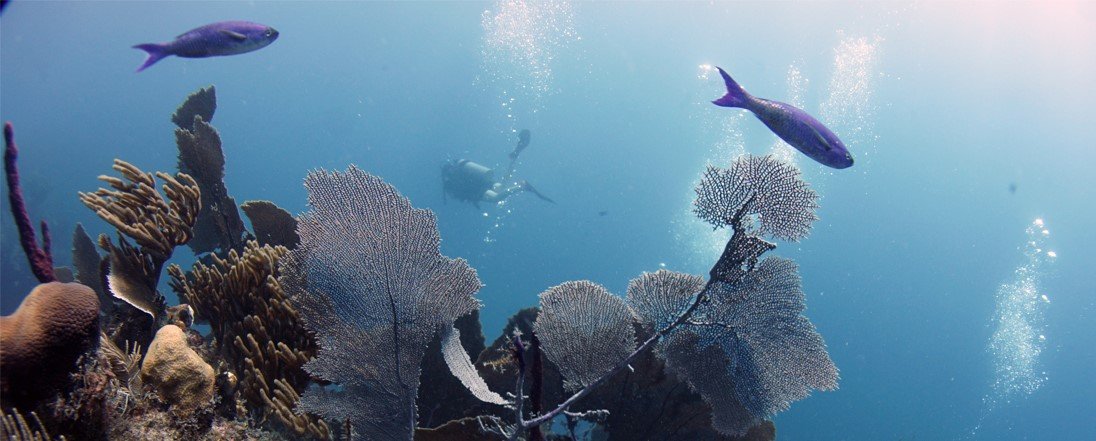To defend the ocean’s biodiversity is to defend human well-being

Photo: Kate Sutter
MAR Fund joins the leadership of the Inter-American Association for Environmental Defense (AIDA) and other organizations by signing the civil society organizations’ declaration titled: DEFENDING OCEAN BIODIVERSITY IS DEFENDING HUMAN WELL-BEING. This declaration calls for concrete and effective actions from the Parties to the Convention on Biological Diversity to protect our oceans and promote sustainable and equitable use of marine biodiversity. We share the declaration, published on AIDA’s website
Statement by civil society organizations at COP16 of the Convention on Biological Diversity (CBD)
The ocean is one of the world’s main reserves of biodiversity, as well as a source of food, renewable energy and our main ally in combating the global climate crisis. Human populations, in addition to having their livelihoods in the ocean, maintain cultural connections around the ocean that define their past, present and future. However, this immense source of life continues to suffer increasingly significant damage and impacts, while efforts to protect and restore it are not increasing at the same rate.
The intrinsic connection between ocean and climate itself embraces the balance of the planet. On the one hand, the ocean regulates weather patterns and, on the other, its characteristics are seriously altered by the climate crisis. The main indicators of these changes are the increase in temperature and sea level, acidification, deoxygenation, modifications in ocean currents, and a greater intensity of hurricanes and meteorological events. This affects marine biodiversity, causing the loss of particularly vulnerable species and habitat fragmentation. Coral bleaching associated with changes in climate, for example, alters the dynamics of many other species that depend on them, generating consequences for tourism, fisheries, climate resilience and biodiversity, as well as socioeconomic and cultural impacts.
Overfishing puts commercial target species and coastal-marine ecosystems in general at risk. Some of the fishing practices of greatest concern are the extraction of vulnerable or endangered species; the non-compliance with or non-existence of closed fishing areas, the demarcation of fishing zones, permitted sizes and volumes; as well as the abandonment of fishing gear, which contributes to the problem of marine debris and causes the death of many animals that are trapped in them. Intensive aquaculture, such as salmon farming, directly destroys the marine ecosystem through contamination due to the constant incorporation of nutrients and the high use of antibiotics, producing anoxia and harmful algae blooms.
Marine pollution from land-based sources continues to be a major stress factor for the marine environment and poses particularly serious problems in developing countries, where integrated waste management is extremely deficient. This has resulted in the introduction of polluting substances and materials into the ocean (untreated sewage, solid waste, including plastics, and agricultural runoff), causing changes in the quality conditions of the water column and sediments, often fatal to marine biodiversity and affecting human health.
Likewise, maritime sources of pollutants require particular attention, as the ocean is the main means of transporting goods globally. Maritime traffic involves the transport of substances harmful to the marine environment – such as hydrocarbons, toxic chemicals, sewage, ballast water, garbage, and other hazardous substances – that are discharged into the sea in routine operational tasks and in maritime incidents. Hydrocarbons pose a particularly complex problem because they are not only transported as cargo but are also used to propel ships, thus representing a latent risk scenario with impacts on air quality due to atmospheric emissions of carbon dioxide, nitrogen oxides, sulfur oxides and methane, mainly in ships that use liquefied natural gas (LNG) for propulsion. In addition, the negative impact on marine fauna of collisions with ships and underwater noise from various sources cannot be ruled out; these factors still lack sufficient and effective public policies and regulations.
Additionally, oil spills in the marine environment cause suffocation and intoxication of marine species, bioaccumulation of harmful substances, and even the functional destruction of important habitats. These impacts in turn affect relevant social and economic activities – such as shipping, fishing, tourism, and port activities – as well as endangering the health and the right to a healthy environment of coastal communities. Spills from offshore oil and gas exploration and exploitation are not adequately controlled and regulated by governments, being authorized activities in the vicinity of vulnerable areas such as coral reefs. These operations face serious limitations to prevent and provide timely response to spills with mitigation, restoration, and compensation actions for the damage caused. Environmental impacts from related activities, such as seismic exploration, dismantling of underwater infrastructures and platforms, and associated maritime traffic, are rarely evaluated.
Finally, although there are no exploitation efforts yet, underwater mining poses risks that are impossible to assess in their magnitude, including habitat destruction, which could be irreversible, and species extinction. This is especially worrisome considering how little is known about the ecological and physicochemical dynamics in deep-sea and deep-sea ecosystems. The development of these intrusive activities – without having the technical and scientific base information that would allow us to objectively identify the potential impacts, as well as the possibility or not of preventing, mitigating or restoring damages – would doubtless cause the alteration of a highly sensitive and complex ecosystem.
In consideration of the above – in our role as civil society organizations working for the protection and sustainable use of the ocean and for the defense of the right to a clean, healthy and sustainable environment – WE URGENTLY CALL ON THE STATES PARTY TO THE CONVENTION ON BIOLOGICAL DIVERSITY TO:
- Incorporate the ecosystem approach – which notes the interdependence between the atmosphere, land, and ocean – into their national biodiversity policies, strategies, and action plans, considering the provisions set forth in the Advisory Opinion of the International Tribunal on the Law of the Sea, which notes that anthropogenic greenhouse gas (GHG) emissions meet the definition of marine pollution under the UN Convention on the Law of the Sea.
- Use environmental impact and cumulative impact assessment tools to promote transparency and citizen participation with a gender focus and with emphasis on the consultation and consent processes of groups in vulnerable situations, such as indigenous peoples and local communities, so that the traditional and cultural knowledge that comes from the territories is included and valued to promote the implementation of projects and human development activities in a responsible and fair manner, weighing the right to a clean, healthy and sustainable environment over short-term economic benefits.
- Sign, ratify, and commit to the effective implementation of the Regional Agreement on Access to Information, Public Participation, and Access to Justice in Environmental Matters in Latin America and the Caribbean (Escazú Agreement) for these rights, and establish mechanisms for transparency and accountability in any environmental proceedings.
- Apply the precautionary principle in the absence of certainty or scientific information and recognize technical knowledge, science, and local wisdom as the basis for decision-making processes focused on the protection of the environment and biodiversity.
- Sign, ratify, and commit to the effective implementation of the Agreement on the Conservation and Sustainable Use of Biodiversity beyond National Jurisdiction (BBNJ Agreement), an instrument that will make it possible to advance in the protection of at least 2/3 of our planet. This will allow for: the equitable sharing of benefits derived from the use of marine genetic resources; the use of area-based management mechanisms, including the designation of marine protected areas; the development of environmental impact assessments prior to offshore activities; as well as capacity building and the transfer of marine technology for the benefit of the ocean.
- Continue to apply moratoriums on underwater mining activities based on the lack of sufficient technical and scientific information to foresee, prevent, control, and mitigate the potential impacts on the biological diversity of unknown ecosystems in deep waters and on the seabed.
- Sign, ratify, and commit to the effective implementation of the Agreement on Port State Measures (MERP Agreement) – to prevent, deter, and eliminate illegal, unreported, and unregulated fishing – as well as the Agreement on Fisheries Subsidies, to promote fishing practices that recognize the relevance of ocean sustainability.
- Strengthen and harmonize regulations on fishing and aquaculture, also advancing in their correct control, with the objective of ensuring the sustainability of these activities; avoiding illegal, unreported, and unregulated fishing; minimizing negative impacts on marine ecosystems and vulnerable species.
- Implement the Guidelines for Achieving Sustainability in Small-scale Fisheries in the Context of Food Security and Poverty Eradication (SSF Guidelines) in order to: recognize the contribution to the fishing economy of men and women working in all activities of the fisheries value chain; guarantee food security and the right to food; contribute to the development of communities engaged in this type of fishing; achieve sustainability of fishery resources; as well as promote culture and ancestral and traditional knowledge around fishing.
- Advance quickly and effectively in the process of negotiating a legally binding instrument on plastic pollution through the application of the circular economy model and responsible management throughout the entire cycle of these products.
- Plan mitigation and adaptation actions in the short– and medium-term to address the effects of the climate crisis on the ocean and protect its carbon sinks through strategies and policies that contemplate the just and equitable energy transition in ocean-dependent sectors, in addition to the conservation and restoration of key ecosystems such as mangrove forests, seagrasses and coral reefs with a holistic and socio-ecological approach. The obligation of States Parties to the United Nations Framework Convention on Climate Change (UNFCCC) to submit updated Nationally Determined Contributions (NDCs) by 2025 is an opportunity to include, as climate commitments, measures aimed at mitigating impacts on the ocean and their restoration. These measures should not be limited to the creation of carbon markets in the ocean, but rather ensure the comprehensive protection of marine and coastal ecosystems, especially considering their fundamental role in climate regulation.
- Sign, ratify, and commit to the effective implementation of the Convention for the Protection and Development of the Marine Environment of the Wider Caribbean Region (Cartagena Convention); prioritize the creation and application of national regulations on standards and permitted thresholds for the discharge of polluting substances into the sea, harmonized with international law, and based on follow-up and monitoring programs that respond to the dynamics of each country.
- Adopt relevant domestic measures to reduce anthropogenic pressures currently affecting coral reefs, slowing the processes that are causing their degradation and allowing coral cover to be maintained at minimum levels that guarantee their permanence and connectivity. These measures include:
- Regulating environmental impact studies and management plans for offshore hydrocarbon extractive and prospective activities and other activities carried out near coral reefs and areas sensitive to coral bleaching.
- Avoid authorizing offshore hydrocarbon exploration and exploitation activities near coral reefs.
- Regulate the transit of ships near marine protected areas and particularly sensitive marine zones in terms of ballast water pollution and other polluting technologies for the marine environment that may affect the state of coral reefs. This will also reduce the possibility of accidents and groundings.
- Guarantee the rights and meet the needs of coastal and island communities that live from fishing – especially artisanal fishing – and local tourism that are being affected by the climate crisis and environmental problems, seeking to protect them from the degradation of marine-coastal biodiversity.
- Increase governmental efforts to create and implement programs and activities for capacity building and transfer of marine technology to reduce the gaps between developing and developed countries. This will enable ocean protection to be embraced globally as a pathway to climate and environmental justice.
- Guarantee the financing of policies, programs, plans, studies, and regulations, ensuring the necessary budgetary allocations to safeguard and manage coastal-marine ecosystems. To this end, they should target the use of all available means within countries, as well as international climate finance funds, cooperation projects and multilateral instruments dedicated to addressing the climate crisis and the mechanisms that have been agreed upon in the framework of the UNFCCC and the Paris Agreement, including the Green Climate Fund (GCF), as well as available resources from the private sector. Similarly, blue finance mechanisms that benefit vulnerable groups and have a positive impact on ocean health should be prioritized.
Effective protection of our ocean is not possible without the commitment of the States Parties to the Convention on Biological Diversity. We therefore call for action and the definition of urgent national and international interventions to strengthen ocean governance.
The risks of ignoring the accelerating impacts are too great. It is time to prioritize the health of the ocean and with it our own health.
Signatory organizations:
Interamerican Association for Environmental Defense (AIDA).
Mexican Center for Environmental Law (CEMDA)
Center for Marine Justice
Mesoamerican Reef Fund (MAR Fund)
Cethus Foundation
MarViva Foundation
Healthy Reef Initiative (HRI)
Coral Reef Alliance
Foundation for Eco-development and Conservation (FUNDAECO)
High Seas Alliance (HSA)
Tags: AIDA, MAR Fund



